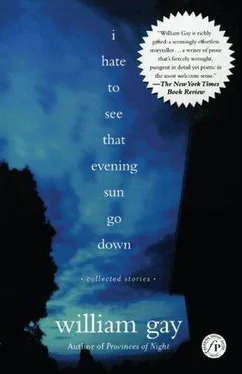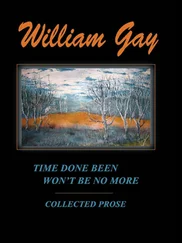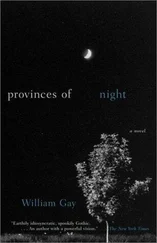They fixed it up legal.
If I was you I’d be packin up my stuff.
We’ll see.
We goddamn sure will. Where s that paper?
Choat got up. It’s up to the house. Well have to go up there.
Then let’s be for goin, the old man said.
THE OLD MAN SAT ON THE DOORSTEP of the tenant house in the shade for a while and thought about things. It was almost twelve miles back to Ackerman’s Field, the nearest town and the one in which Paul did his lawyering. He had no telephone. He had no car; in actuality he owned a two-year-old Oldsmobile and a four-wheel-drive cream-colored Toyota pickup, but Paul had taken them to town for storage and he expected that by now they were somewhere in Mexico with the serial numbers eradicated. He had money, but nowhere to spend it. He had a neighbor across the ridge but he was too weary to walk over there now. Choat’s car had a flat tire, but he had not even factored that into the equation. Folks in hell would be eating Eskimo Pies before Lonzo Choat hauled him anywhere.
Anyway he was home, and it was good to be here. He opened the suitcase and examined its contents. A change of clothing. A razor and a can of shaving cream. A bar of soap. A toothbrush and the sort of miniature tube of toothpaste you see in motel and hospital rooms. A tin of Vienna sausages and a cellophane-wrapped package of crackers he’d brought in case he got hungry on the cab ride. It occurred to him now that he hadn’t eaten since breakfast at the nursing home.
He glanced toward the house. The woman was standing in the door watching him as if she’d learn his intentions, some quality of apprehension in her posture. He looked away and he heard the screen door fall to.
The day was waning. Beyond the frame farmhouse light was fleeing westward and bullbats came sheer and plumb out of the tops of the darkling trees as if they’d harry the dusk on. A whippoorwill called and some old nigh-lost emotion somewhere between exaltation and pain rose in him and twisted sharp as a knife. As if all his days had honed down to this lone whippoorwill calling out of the twilight.
The old man sat for a time just taking all this in. Whippoorwills had been in short supply in the nursing home and it was a blessing not to smell Lysol. He breathed in deeply and he could smell the trees still holding the day’s heat and the evocative odor of honeysuckle and the cool citrusy smell of pine needles.
Well, I never held myself above tenant farmin, he said to himself.
At least the lights worked and he guessed Paul was still paying the light bill. He figured the first one to come due in Choat’s name would be the last. The house was jammed with the accumulation of the years. He had used this place as a junkhouse and now Choat seemed to have toted everything he couldn’t use or didn’t want down from the main house. Boxes of pictures and memorabilia Ellen had saved. Now it was spilled and thrown about at random, and he was touched with a dull anger: his very past had been kicked about and discarded.
He set about arranging some kind of quarters. He carried boxes and chairs and garbage bags of clothing into the bedroom and set up Paul’s old cot by the window for what breeze there was.
He sat for a time bemusedly studying snapshots. Dead husks of events that had once transpired. Strange to him now as if they’d happened on some other level of reality, in someone else’s life. An entire envelope of photographs of dead folks. One of Ellen’s father lying in his casket. His shock of black hair, great blade of a nose. Eighty years old and his hair black as a crow’s wing. Another of Ellen standing by the old man’s grave. He studied her face carefully. It looked ravaged, tearstained, swollen with grief.
He put them away. He had not even known they existed. He had no use for them then or now, and why anyone would need to be reminded of so sad a time was beyond his comprehension.
He fared better in an old brass-bound trunk. Choat had missed a bet here, if he knew he’d kick himself. He found Paul’s old pistol wrapped in a piece of muslin. He unfolded the cloth. An enormous Buntline Special — looking pistol but it was really just a.22 caliber target pistol on a.45 frame. He fumbled around in the trunk but he couldn’t find any shells.
He shuffled through a stack of 78 rpm records reading the labels. Old Bluebird records by the Carter Family, Victor records by Jimmie Rodgers, the Singing Brakeman. “Evening Sun Yodel,” “Away Out on the Mountain.” He could remember hearing these songs in his youth, singing them himself, he and Ellen playing these selfsame records on the Victrola. Jimmie Rodgers was a blues singer and he remembered that Ellen hadn’t been too high on him but she had been fond of the Carter Family. Jimmie Rodgers, dead of TB and still a young man after all these years and even turning a dollar or two off that: and that graveyard sure is a lonesome place, they lay you on your back and throw the dirt down in your face.
Well why the hell not, he thought. He moved stacks of folded quilts, old newspapers off the Victrola and wiped the dust off. The machinery creaked when he cranked it and he doubted it would work.
It did though. The needle hissed on the record and there was Rodgers’ distinctive guitar lick then a dead voice out of a dead time still holding the same smoky sardonic lilt: She’s long, she’s tall, she’s six feet from the ground .
The old man was lost in the song and didn’t hear the girl until she was in the room. He turned and she was crossing the threshold. She had a plate in one hand and a tumbler of iced tea in the other. Jimmie Rodgers was singing: I hate to see that evenin sun go down, cause it makes me think I’m on my last go-around .
He arose and lifted the tonearm off the record.
Mama sent this.
He hadn’t anticipated anything approaching human kindness out of the Choat family and he didn’t quite know how to handle it.
She said she bet you was hungry and hot as it was you needed somethin cold to drink.
He took the plate awkwardly and cleared a spot for it on the coffee table. She set the tea beside it.
Well. You tell her Fm much obliged. What’d Lonzo have to say about it?
He was down at the barn. What’s that you’re listenin to?
That’s Jimmie Rodgers, the Singin Brakeman. Evenin Sun Yodel.
What is that, country? Sure is some weird-soundin shit. Where’s he out of, Nashville?
Hell if he’s out of anywhere. He’s been dead and gone from here over fifty years.
Oh. Well, how do you know he’s in hell?
If drinkin whiskey and runnin other folks’ women’ll put you there then that’s where he’s at. Anyway he’s in the ground with the dirt throwed in his face. That sounds a right smart like hell to me.
Lord you’d cheer a person up. Are you always in this good a mood?
Just when I get rooted away from the trough, the old man said. He was studying the plate. He was of two minds about it. He mistrusted Ludie Choat’s cooking and figured her none too clean in her personal habits but then you didn’t know what was in Vienna sausage, either. All he had was the Viennas and besides there was okra rolled in meal and fried. It had been a long time since he had eaten fried okra. The plate also held garden tomatoes peeled and sliced and he figured if everything else proved inedible he could always eat the tomatoes.
What are you doin, movin in here?
Yes I am. I’ll have it right homey before I’m through. Curtains on the windows, bouquets of flowers to smell the place up. I may get me a dog.
Daddy won’t allow a dog on the place. He can’t stand to hear them bark.
Mmm, the old man mused. Say he can’t?
I got to get back to the house before Daddy turns up. Just set the dishes out on the porch in the mornin, all right?
Читать дальше












